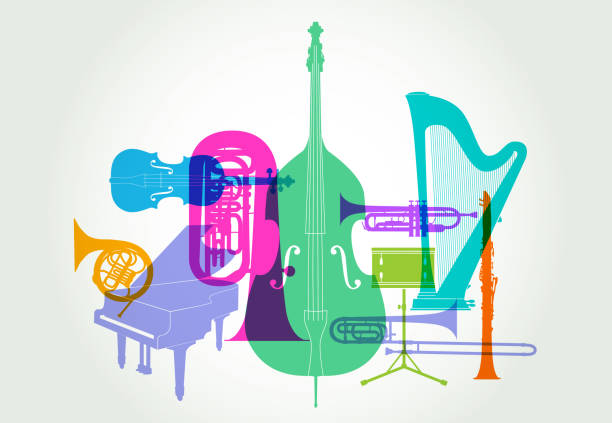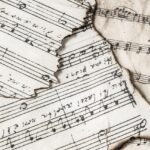I am always, always, listening to music (that is, when I’m not playing it). I’m also always up for sharing my favorite finds and most recent obsessions with anyone who needs good music recs. Here, I’ll share with you six recordings that have been populating my brain in the past few weeks!
Note: For pieces recorded by official record labels, I always recommend listening through a streaming platform or some other reputable source where the artist can receive compensation! While it’s sometimes possible to find pirated uploads of the recordings on youtube, it’s best to support the artist directly 🙂
1. YUJA WANG – Ravel’s La Valse
Ravel’s La Valse – does there exist a more stunning, showstopping piece in the entire piano repertoire? Originally written for orchestra as a Poème Chorégraphique, Ravel prefaced the piece with the statement, “Swirling clouds afford glimpses, through rifts, of waltzing couples. The clouds scatter little by little; one can distinguish an immense hall with a whirling crowd. The scene grows progressively brighter. The light of the chandeliers bursts forth at the fortissimo. An imperial court, about 1855.” I can’t help but love Ravel’s arrangement for solo piano even more than his orchestral one as the single performer takes on an immensely personal interpretation of the piece. Yuja Wang’s recording is nothing short of outstanding. I especially love the lilting feel of the waltzing base line – its exaggerated dance-like character always sticks in my head.
2. BRIDGET KIBBEY – Every Lover is a Warrior for Solo Harp by Kati Agócs
Spotify: https://open.spotify.com/album/2Sze7ml5wWRAOfvXc1pPxV?si=YG_sGyA_T36dcWo9lSxRbg
Apple Music: https://music.apple.com/gb/album/love-is-come-again/1089652197
I heard this recording on the radio recently and found myself inspired and curious, especially since I rarely ever listen to music for solo harp. Written by Canadian-American composer Kati Agócs, the cycle contains three movements that circle through traditional folk songs from different countries. The first movement, John Riley, is based on the Appalachian song of the same name and has a bluegrass feel. The second movement is based on a French hymn, and the fascinating theme is developed through an intriguing ostinato. The third movement is based off of Hungarian folk songs, and all of the traditional melodies used are tied together by the theme of love and soldiers. All in all, I found it an incredibly interesting listen.
3. VALERY GERGIEV AND THE MARIINSKY ORCHESTRA – Tchaikovsky’s Symphony No. 6
Watch here: https://youtu.be/EHgHgbZ8YB8
My latest obsession is, without a doubt, Gergiev. The Tchaikovsky Symphonies are the pieces I always return to – I’ve listened to so many recordings, and the 6th symphony will forever be one of my favorite pieces of music, ever.
It’s rare to find a recording that completely changes your impression of familiar music. This is one.
Gergiev is the master of sound. You’ll notice how the strings don’t completely meld together – the layers are rich, the bass is heavily supported, and sometimes you’ll hear a gravelly, imperfect sound. The result? One of the warmest, most lyrical orchestra tone qualities I’ve ever heard. It lifts off the stage, even in recording.
I must recommend that you listen to the recording in its entirety. It’s a transformative experience. Listen to how Gergiev provides the utmost care to every single phrase … the tail of each phrase seems to linger, the music always holds on.
4. MIDORI – Chaconne from the 2nd Violin Partita of J.S. Bach
Midori is one of my greatest musical inspirations. She not only plays with such distinct and profound artistry; she also speaks with articulation and poise. This Bach Chaconne is heavenly: simple yet overwhelmingly complex, free but carefully constrained, it is musically divine.
Midori feels no need to insert innovative ideas or gestures into the music. Instead, she plays the music as it is with Bach’s full intention. Midori is such a great musician because she listens to herself, and understands how she is playing. The recording location of Castle Köthen, where Bach originally wrote his solo violin works, draws me the closest I’ve ever been to Bach.
5. THE DELTA TRIO – Lera Auerbach’s Piano Trio No. 1
Spotify: https://open.spotify.com/album/2c1DLlKSSQMYsAVqfpSQ2n
Apple Music: https://music.apple.com/us/album/the-mirror-with-three-faces-feat-vera-kooper-irene/1347170176
While I’m not always the biggest fan of contemporary music, Lera Auerbach is a composer I’ve come to love. It’s no wonder that she chose to score this piece for piano trio, since she artfully develops dialogue between all of the three instruments. Notably, I enjoy the fast-paced and chaotic energy stored within the third movement, the presto. Once the opening frenzy is pulled away, the sound of the piano seems to echo from some distant place alongside the sul tasto strokes in the strings.
6. MITSUKO UCHIDA, SIR SIMON RATTLE, AND THE BERLINER PHILHARMONIKER – The Beethoven Piano Concertos
Spotify: https://open.spotify.com/album/4iLhGksq5xF6gKVuIeARFy
Apple Music: https://music.apple.com/us/album/beethoven-piano-concertos-1-5/1488447983
Uchida tackles the mighty task of recording all 5 piano concertos, and she approaches each one with a new freshness and distinct vision. The result is a recording that’s sparkling, bright, and cohesive, providing new insight to an often-recorded cycle. As I prepared to perform the 2nd Concerto in its entirety with a local orchestra a few weeks ago (I’m not yet ready to perform all five … but someday!), I found myself frequently returning to this recording.
What I find myself looking for in Beethoven’s music right now is clarity. Uchida carries her incredibly clear and direct sound from the Mozart Concertos into Beethoven’s works that are more dense, more romantic, and often less intuitive to play.



